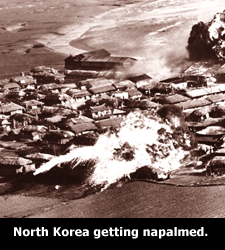Lots of news about official enemies this past week. Plenty of footage from the funeral of Kim Jong Il, showing legions of North Koreans – many in uniform – displaying their exaggerated grief. (Hey… those folks know what they need to do to get ahead.) And of course the Iranian threat to shut down the Strait of Hormuz if the latest round of draconian sanctions recently passed by the Senate – 100 to 0, mind you – become law. The latter is, naturally, the primary obsession of our news media and our government; the former a mere source of fascination and amusement. Both provide ample opportunities to perpetuate the official line on each of these societies, about which the less we know the better.
But let’s look a little closer. Why is North Korea such a strange, strange place? Lots of reasons. The hermit kingdom is a major thread running through Korean history. More importantly, though, is the experience of the last century – namely, that of the thirty year Japanese occupation, followed by occupation and subsequent destruction by the U.S. during the Korean War. Few Americans know the impact that war had on North Korea; we mostly focus on the fact that the North invaded the South –  Korea invading Korea – but not on the devastating attack we mounted against them. Christine Ahn of the Korea Policy Institute spoke to this fact on Democracy Now! last week:
Korea invading Korea – but not on the devastating attack we mounted against them. Christine Ahn of the Korea Policy Institute spoke to this fact on Democracy Now! last week:
When I went to North Korea, others-I had a very interesting insight, where I would travel around the country, and with our guides, you know, they would always point to this building. This was a restaurant. It was, you know, a very ancient-looking Korean building. But it was-I was wondering, why are-why do they always keep pointing that building out? And the thing that was really surprising is that was the only building that remained since the Korean War. Otherwise, the rest of Pyongyang was essentially leveled. And that was because of the devastating air raids. More bombs were dropped in the Korean War than in World War II. Napalm was introduced. I mean, the U.S. bombed dams, which was considered a war crime under the Geneva Convention.
It’s a similar story with Iran. Around the time we stopped drenching North Korea with napalm, we were fomenting a coup in Iran that brought in the Shah, who tortured his way through the next 25 years until the Iranian revolution. After that, we supported Saddam Hussein’s 8-year attack against Iran, which cost them about 800,000 lives. If Iran wants a nuclear capability, it’s likely as our own intelligence service estimates suggest – an attempt at building a deterrent. We invaded countries on both sides of Iran, neither of which had nuclear weapons. We did not attack North Korea, which does have nukes. What lesson should the Iranians draw from that?
There’s a tone of near outrage over the notion that the Iranians would threaten retaliation over sanctions. Fact is, they’ve seen what sanctions can do, both at home and in neighboring Iraq. Much as they are a repressive regime with a poor record on human rights, it is easy to understand why they would respond in this way. What I don’t understand is why we seem unable to anticipate that.
luv u,
jp
